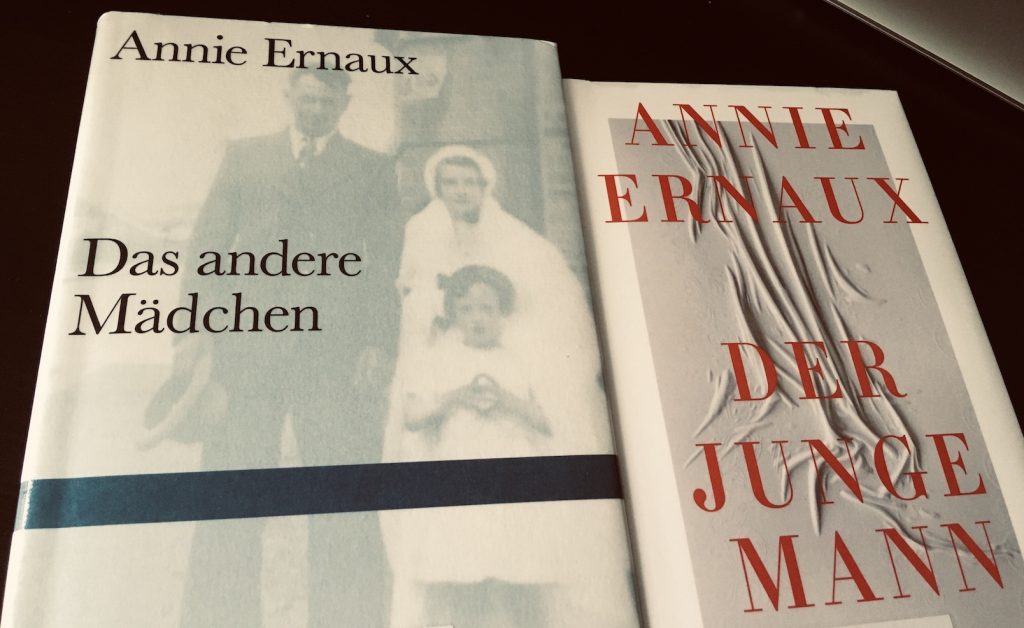One could I suppose wonder whether there comes a point where all the small and greater stories of any one life have been told – memories revisited and retold, enough secrets divulged. Should such a point of saturation exist (a hypothetical I may well argue against), it seems that, in the case of Annie Ernaux, it has not yet been reached.

Corresponding with an excellent magazine piece (subscription) by Rachel Cusk in The New York Times last weekend, I had coincidentally borrowed two slight – very slight – installments in that aforesaid life; both published in translation only quite recently in Germany.
In Das andere Mädchen (L’autre fille, NiL Éditions, 2011), Ernaux gives life to the no-memory-of a sister she didn’t have; for the death from diphtheria of she named Ginette predated her own birth. Written (mostly) in a mini Briefroman form addressed to this at first unknown sister – and always aware of the irrationality of this exercise – that no-memory becomes essential to her real memories: of discovering as a ten year old, and only through chance, of Ginette’s existence, and the realization that Ginette’s death is for Annie existential (her parents only intended to have one child); of her parents who never spoke of their loss; of their fear of losing another; of their expectations for Annie, the replacement. It is almost as if her whole childhood was lived in the haunting shadow of another.
L’autre fille (only sixty or so pages) has not been translated into English. (Perhaps due in this instance to the smaller French publishing house rather than Gallimard?) A translation note unto myself: Given that the book builds on that overheard conversation which ends with Annie’s mother stating that Ginette was “viel lieber als die da”, that is, “much more lovable/better/preferable as [Annie]”. I can only say: good luck with that one!
Did I say: slight, very slight? Now, Der Junge Mann, is really very slight – about thirty pages, each formatted, shall we say, ‘opposite of condensed’. In the French original, Le jeune homme, Éditions Gallimard, 2022, this life fragment (you see I am grappling with what terminology to apply to these Ernaux-esque episodes!) was written in the last year of the last millennium and revolves about Annie Ernaux’s relationship with a thirty year younger student called only A. – Ernaux was in her mid-fifties – that has presumably not long ended. (Here, at UK Vogue – surprisingly! – is an excerpt.)
The age difference matters – not only in the public space (no, the French are not immune to the dictates of societal norms) but also in their private interactions; to paraphrase: i would like you to have my baby, he says at one point … well, that is just not going to happen, her obvious reply. (Though, she who had two children in her twenties and had never contemplated anymore, did find herself idly wondering what, with all the new technology and stuff, that would be like!) And age is often a determinate of the power balance. In this relationship, had the age difference been the other way round, the young man (then no longer young – even for a bloke !) would have had more options in which to exercise power (and at the same time without eliciting the glares of disapproval afforded an older woma), but against the norm here it is clear that Annie is control. She instigated this thing and she will end it.
The question remains: was this for Ernaux simply an arrangement of convenience (for her )? One that fulfilled not only her physical needs – for sexual intimacy and the rituals and familiarity of a partnership – but, importantly, her intellectual needs as a writer whose sharpest tool was that of memory? In that respect A. offered a convenient conduit to her past. He was from a similar working class provincial milieu (she says that, but Ernaux’s experience, born in 1940 and growing up in the immediate decades after, surely were substantially different to a young man born, say, in 1970?); as she did, he, too, is studying in Rouen with the minimum of resources and an uncertain future. Observing him at a place she once was, had a way of stimulating feelings and emotions that she had thought long left behind. The most startling of these the abortion that she had as a student, and in the hospital to be seen from A.’s window. The book ends with the end of the relationship and Annie having written down the trauma of that experience, published the next year in France as L’événement and written about by me in this post.
These works continue Annie Ernaux’s excavation of her person and her past; with each shifting the perspective of the story we thought we knew that came before. I would be surprised if they were to be the last.
English translations of Ernaux’s work are available through Seven Stories in the U.S. and Fitzcarraldo in the U.K.
May 14 2023: Some days later, prompted by a discussion elsewhere, I have found myself making a connection between Annie’s story about her sister (in L’autre fille) and that other which told about her abortion as a young woman (inspired during the time frame covered in Le jeune homme and explicitly written about in L’événement). Both of these forms of absence, have, it seems to me, moved Ernaux to reflect upon what is left behind in the gaps of unrealized, or not wholly so, lives. I have often talked about Ernaux’s writing of her own life, but perhaps, here, the imperative was to write and memorialize two ‘lives’ that were, to various degrees fleeting, but, nevertheless, profoundly influenced the course of her life.
